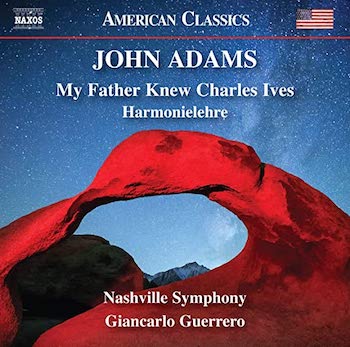Classical Album Review: John Adams Orchestral Works
By Jonathan Blumhofer
My Father Knew Charles Ives and Harmonielehre make an excellent pairing on the Nashville Symphony Orchestra’s new all-Adams album, led by music director Giancarlo Guerrero.
 John Adams’s Harmonielehre is that rarest of breeds: a modern symphonic classic from the day of its 1985 premiere. A symphony in all but name, its three movements weave the best principles of Minimalism and chromatic lyricism into an absorbing, 40-minute-long span.
John Adams’s Harmonielehre is that rarest of breeds: a modern symphonic classic from the day of its 1985 premiere. A symphony in all but name, its three movements weave the best principles of Minimalism and chromatic lyricism into an absorbing, 40-minute-long span.
While Harmonielehre has become something of an Adams orchestral calling card, the composer’s 2003 My Father Knew Charles Ives has rather languished in the shadows. Written (like Harmonielehre) for the San Francisco Symphony, My Father Knew Charles Ives utilizes a similar three-movement form and minimalistic gestures assert themselves here and there (most prominently in the finale, the driving “The Mountain”).
But the mood and tone of My Father Knew Charles Ives is different from that of Harmonielehre. Adams’s orchestration in it is more sophisticated and discreet. Expressively, his writing in it is more nostalgic and emotionally ambiguous. Technically, it’s a more complex and impressive accomplishment.
As such, My Father Knew Charles Ives and Harmonielehre should make for an excellent pairing – and so they do on the Nashville Symphony Orchestra’s (NSO) new, all-Adams album (on Naxos), led by music director Giancarlo Guerrero.
Theirs is, in fact, just the second recording of My Father Knew Charles Ives and, if it doesn’t quite match Adams’s own 2006 account (with the BBC Symphony Orchestra) for balance and abandon, it certainly doesn’t want for drive, color, or character.
Tempos always move smartly. In the first movement, “Concord,” that results in a couple of moments wanting for mystery (like the arrival of the E-flat and B-flat-major triad that alternate around the movement’s midpoint). But, otherwise, one appreciates the direction of Guerrero’s reading, particularly in the second and third movements.
To be sure, he draws plenty of atmosphere from his forces, especially in the beguiling second movement (“The Lake”), with its dulcet bent notes, sly big-band allusions, and fine actualization of Adams’s subtle quarter-tone writing. The finale, highlighted (like in the first movement) by some excellent trumpet solos, is conspicuously well paced and taut, both rhythmically and expressively.
Good as this My Father Knew Charles Ives is, the NSO’s Harmonielehre proves a mite less compelling. This is, by my count, at least the seventh recording of the piece since 1990 – an impressive mark for any orchestral work. Given that four of those earlier accounts are led by either the composer, Michael Tilson Thomas, Simon Rattle, or Edo de Waart (who conducted the world premiere), the competition is that much steeper.
Guerrero and his orchestra don’t want for muscularity or energy: they offer plenty of both – and tempos are pretty snappy overall, as well.
Interpretively, though, theirs is a literal approach. For all the purpose of the playing, the central lyrical section of the first movement really needs more room to breathe; bigger dynamic contrasts, too, would help it achieve more of a weighted presence. Just listen to Adams (with the Berlin Philharmonic), whose approach is far more expansive, or MTT (with the San Francisco Symphony), who is just as aggressive in his tempos as Guerrero, for a sense of what this piece really needs in order to come to life.
While the central movement (“The Anfortas Wound”) works well and there’s a nice, rhythmic pop to the NSO’s playing in the finale, textures are too often undifferentiated and blurry, especially in the latter (this is also an issue in the transition to the first movement’s coda).
That said, the NSO’s isn’t a bad Harmonielehre; it’s just overshadowed by its predecessors. Given the easy availability of those earlier releases, the reason you’ll probably want this album, then, is for the Nashville players’ finely done My Father Knew Charles Ives.
Jonathan Blumhofer is a composer and violist who has been active in the greater Boston area since 2004. His music has received numerous awards and been performed by various ensembles, including the American Composers Orchestra, Kiev Philharmonic, Camerata Chicago, Xanthos Ensemble, and Juventas New Music Group. Since receiving his doctorate from Boston University in 2010, Jon has taught at Clark University, Worcester Polytechnic Institute, and online for the University of Phoenix, in addition to writing music criticism for the Worcester Telegram & Gazette.
Tagged: Giancarlo Guerrero, Harmonielehre, John Adams Orchestral Works, Nashville Symphony Orchestra

[…] Recordings Classical CD Review: John Adams Orchestral Works https://artsfuse.org/220153/classical-cd-review-john-adams-orchestral-works/ […]